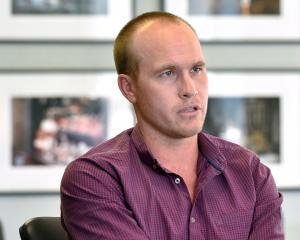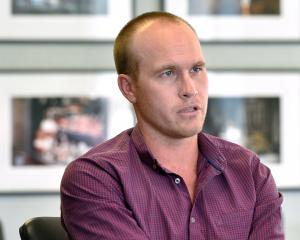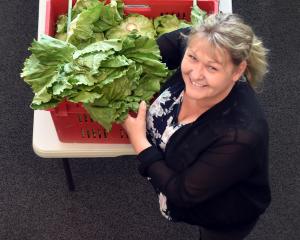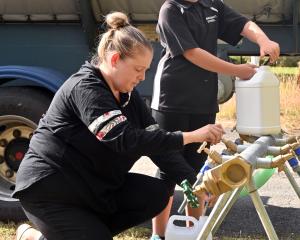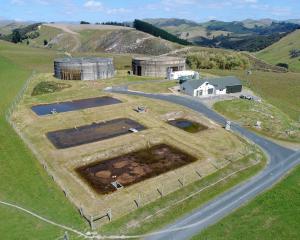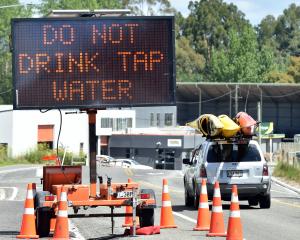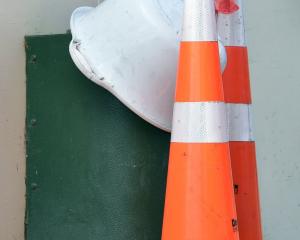Elevated levels of lead were detected in an Otago water supply as far back as August, but officials did not issue an order to prevent people drinking the water until this week.
The result was thought to be a one-off spike, but indications something was amiss cropped up again in December, before a sample taken last month pointed to a wider problem.
Waikouaiti and Karitane residents have since been told by the Dunedin City Council not to use tap water for drinking, cooking or preparing food.
Tuesday’s order came after testing at the Waikouaiti raw water reservoir showed elevated lead levels at the water source.
The city council has said there is no evidence of lead contamination in other Dunedin water supplies, but testing is being carried out to make sure.
However, both the council and Public Health South were aware of increased lead readings at Waikouaiti last year and did not alert the public.

Dunedin City Council infrastructure services general manager Simon Drew said six samples out of 90 in the past six months showed elevated lead levels.
Four were recorded at the Waikouaiti Golf Club near the end of the supply line, one at the Karitane Bowls Club and one at the Waikouaiti reservoir.
The first of those was received on August 13, 2020.
Officials thought regular sampling showed no evidence of a continuing problem, until results of a January 20 test from the reservoir were received on Friday last week, prompting Tuesday’s notice.
Prof Ian Shaw, of Canterbury University, told RNZ’s Midday Report the response should have been quicker.
Drinking the water for a couple of days would not have much effect on people, he said.
It could result in anaemia in the short term, but longer-term lead accumulation could harm the nervous system, he said.
Southern District Health Board medical officer of health Susan Jack said yesterday there had been no notifications of anybody with increased lead levels from the water contamination.
Dr Jack said it was still safe to use the water for bathing, washing hands and clothes.
"We remind everyone that boiling water does not remove lead. Rather, it can increase its concentration in water, so it is important for people to follow the advice and do not drink the water, or use it for cooking or preparing food."
The source of the contamination has yet to be found.
Lead joins on pipes were one possible source, as was environmental contamination. There are no lead joins in the pipe supplying the reservoir.
Yesterday, council staff used a helicopter to fly over the catchment for Waikouaiti and Karitane, looking for signs of any source of contamination.
The council had about 40 staff door-knocking in affected communities yesterday afternoon to discuss the situation with residents.
Dunedin Mayor Aaron Hawkins said the council had followed advice from Public Health South throughout and took decisive action on Tuesday.
Some internal processes "could have been better, and have been changed already, but none that would have produced a different outcome".
One problem was that an email about lead sent on December 18 to a council staff member on leave was not opened until January 7.
However, Mr Hawkins said, an independent drinking water assessor found "no need to notify the wider community of the elevated results until Tuesday".
The tests had been carried out by Eurofins to assess pipe corrosion and were not expected to flag concerns about drinking water.
The council says the January 20 test was the first to warrant the notice not to drink water.
Dr Jack confirmed Public Health South was told about two unusually high test results before Christmas.
"Our initial approach was to check the accuracy of the results, any particulars around the testing sites, and monitor the situation closely," Dr Jack said.
Testing was stepped up.
"On Monday, we received information that an elevated result had been gathered from raw water at the reservoir.
"This raised concerns that there could be contamination in the wider water supply, so we made the recommendation to take a precautionary approach."
Anybody with health concerns should see their GP, she said.
Water tankers have been stationed in Karitane and Waikouaiti.
Waitaki District Council assets group manager Neil Jorgensen confirmed the Stoneburn Rural water supply might be affected.
It would be tested, as well as the Shag River, supplying Palmerston, and the Oamaru supply.
Waitaki tests in December 2019 revealed no cause for concern and new test results could be back next week.
What we know:
- Waikouaiti-Karitane water tested 90 times since July 2020.
- Six tests show elevated lead levels.
- First test results showing elevated lead levels in August.
- Elevated lead levels at Waikouaiti Golf Club (4 times), Karitane Bowls Club (1), Waikouaiti raw water reservoir (1).
- No-drink notice issued Feb 2 (after reservoir test result received Jan 29).
- Two test results emailed to DCC on Dec 18 not opened until Jan 7.
- DCC changes email procedures.

